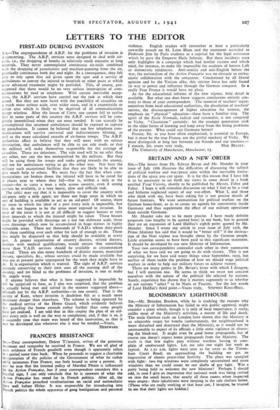LETTERS TO THE EDITOR
FIRST-AID DURING INVASION
SIR,—The unpreparedness of A.R.P. for the problems of invasion is d ,concerting. The A.R.P. services were designed to deal with air- ra:ds, i.e., the dropping of bombs in relatively small amounts at long intervals. They never contemplated continuous air-raids combined w.th the dropping of parachutists and machine-gunning from the air, practically' continuous both day and night. As a consequence, they felt able to rely upon first aid given upon the spot and a service of ambulances to convey the injured to hospitals or other posts at which more advanced treatment might be provided. This, of course, pre- supposed that there would be no very serious interruption of com- munications by road or telephone. With certain inevitable excep- tions, the A.R.P. services have carried out the task at which they aimed. But they are now faced with the possibility of casualties on a much more serious scale, over wider areas, and in a countryside or urban area which is likely to be deprived of all communications except wireless. After the lesson of Crete, one cannot fail to realise that in some parts of this country the A.R.P. services will be com- pletely immobilised when they are most needed. It can scarcely be contemplated that unarmed ambulances should be exposed to capture by parachutists. It cannot be believed that our few telephone com- munications will survive universal and indiscriminate blitzing, as well as the more calculated assaults of air-borne troops. The A.R.P. authorities affect to believe that they will meet with no serious obstruction, that ambulances will be able to use side roads, or that the military will make themselves responsible for the carriage of casualties. These are delusions. The side road will be no safer than any other, nor any the less monopolised by the military. But they will be using them for troops and tanks going towards the enemy, and not for ambulances trying to go the other way. Nor have the military such exceptional facilities that they are likely to be able to give much help to others. We must face the fact that when com- munications are broken down the injured will have to be cared for at places near to where they fall—that is, within a mile at the utmost—for to carry a man a mile across country, even if strong carriers be available, is a very heavy, slow and difficult task.
The critic may say that it is impossible to cover the country with aid-posts only a mile apart; are there not huge areas in which no sort of building is available to act as an aid-post? Of course, there are areas in which the ideal of a post every mile is impossible, but they do not happen to be the areas most exposed to invasion. In most of the latter it is not at all difficult to suggest houses at very short intervals to which the injured might be taken These houses might be provided with dressings on a not too elaborate scale, those same dressings which now lie accumulated in huge masses in highly vulnerable areas. There are thousands of V.A.D.s whose duty-posts find them tumbling over each other for lack of enough to do. These also might be dispersed so that help should be available at every post. A proper organisation of country doctors, retired doctors, dentists with medical qualifications, would ensure that something more than V.A.D. services should be available as circumstances allowed. There are also many hundreds of district nurses, municipal doctors, specialists, &c., whose services could be made available but who are at present quite unprepared for the work they might have to do. It is organisation which is wanted. The sight of A.R.P. services jealously conserving to their own uses all the nursing skill of the country, and yet blind to the problems of invasion, is one to make the angels weep.
If anyone believes that what is here suggested is impossible he still be surprised to hear, as I also was surprised, that the problem is actually being met and solved in the manner suggested above— although not by the A.R.P. authorities—in one county. That is the county of Kent, where invasion is doubtless felt as a much more imminent danger than elsewhere. The scheme is being operated by the medical service of the Home Guard, which evidently believes that guarding the home extends rather further than some people have yet realised. I am told that in this county the plan of an aid- Post every mile is well on the way to completion, and, if that is so, it is assuredly time that more was heard of this innovation, so that it may be developed also wherever else it may be needed.—Yours,
HEREWARD.


























 Previous page
Previous page